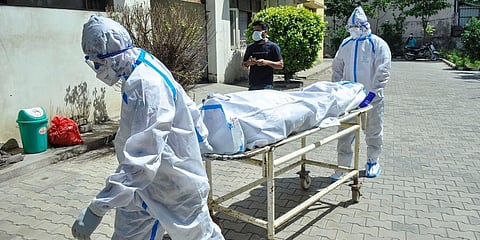

Burning pyres, hastily put together makeshift cremation grounds and unidentified mortal remains floating in rivers have left citizens in anguish and also stirred debates on the administrative capability of the states. The inhumane disposal of the Covid-19 affected cadavers raises questions on the absence of sensitivity that the state machinery ought to be otherwise manifesting. This has led the judiciary to comment that the Covid-afflicted are not being treated with dignity, even in their death. Post-mortality management in the Covid-19 era is a spectrum that needs to acknowledge the rights of the deceased for a dignified final journey, ensure the emotional and physical well-being of people involved in the funeral process, consider the customary sentiments of the bereaved, adopt bio-medical waste management models and simultaneously operate within the perimeters of the laws in force. Though numerous guidelines and advisories have been issued by the Ministry of Health and Family Welfare much earlier, we still have few examples to talk of due to the absence of long-term implementational tactics. A week after the National Human Rights Commission notified its advisory on ‘Upholding the Rights and the Dignity of the Dead’, an incident of a garbage truck carrying the corpse of a young adult in Madhya Pradesh has amplified the need for the state and the local administration to establish a sustainable and credible system of body disposal. The incapability of managing post-death situations effectively and sensitively not only impacts the bereaved negatively but also carries the potential to cause social unrest.
The impact upon the bereaved and the citizens is in multiple ways and in varying degrees. Financial challenges, emotional rollercoasters, confusion arising due to not being aware of relevant procedures, not being able to complete the rituals due to lockdown rules and hospital managements unable or unwilling to cooperate are just a few. Funeral processes demand sufficient crematoriums, accessibility and affordability of wood or furnaces, ambulances or hearse vans for conveyance of cadavers, and a reliable point of contact to guide them through the legal obligations. These issues are further complicated with the ambiguity in the need for various documents and the process for their validation. The fears and dilemmas of an individual, lack of identity proof documents and the absence of kith and kin have left many cadavers unclaimed, which is an added shocker for the administration.
While these lapses have dominated the public narrative in the initial months of the second wave, we see some evidences of governments putting their act together. The success of any administrative strategy is dependent on the interplay between bureaucratic reliability, political support, intra-society coordination and the cooperative efforts of citizens. Bengaluru’s centralised and distinct Covid-19 cadaver disposal system, which involves both civilian volunteers and statutory authorities, deserves praise. Bruhat Bengaluru Mahanagara Palike established the BBMP Crematorium Helpline, a single official government window that functions round the clock to assist citizens with the post-mortality procedures in its jurisdiction. The Helpline books slots in crematoriums, offers ambulance services, assists the bereaved with the documentation processes and renders every other relevant service without any cost. It has also adopted a complaint redressal mechanism that makes the system reliably accountable. In Hyderabad too, the State Forest Development Corporation has stepped up to provide free supply of wood to the crematoriums. The Hyderabad Municipal Corporation has launched the Antim Yatra Rathamulu service that offers free conveyance of cadavers across the city. The services can be availed by reaching out to the GHMC’s Covid-19 Control Room. The Greater Chennai Corporation too adopted the Bengaluru model and launched a helpline number to assist with issues pertaining to cremations and burials.
It is, therefore, time for states and local administrations to prudently examine the mechanisms adopted by other successful jurisdictions and implement the proven features in their own machinery. However, any administrative policy would perform better only if it enjoys public cooperation. In Basapura, a village in Karnataka, an ambulance carrying a corpse of a Covid-19 deceased was stopped, due to the fear of transmission of the infection from the cadaver. In other parts of the country, there are instances of financial extortion by mortuary staff, crematorium workers and hearse van drivers. The local administrations need to work on their grievance redressal mechanisms by not only imposing liabilities but also by understanding the factors that led to such acts. The states’ job goes beyond putting an end-to-end efficient system in place; they should also reach out to the people through campaigns focused on dignity, humanity and empathy. There have been many heartwarming instances of complete strangers taking over the last rites, sometimes cutting across caste, community and religion divides.
Indian case studies get cited during all kinds of discussions and debates related to Covid-19. Here is a chance to be a shining light in an otherwise depressing record.
Jayesh Ranjan
IAS officer in Telangana
Amulya Anil
Law student at Symbiosis Law School, Hyderabad